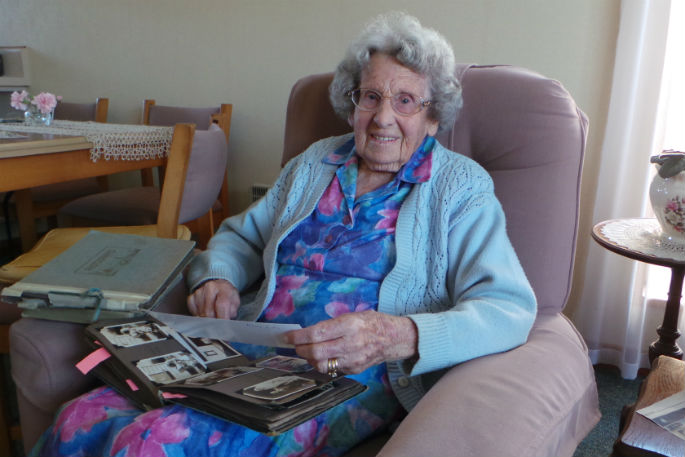It's probably not what Mount Maunganui wants to hear.
'It used to have personality. It used to have charm,” says Molly Little who's knocking on 94.
Molly's a pet name for Margaret or Mary but cheekier and nicer. 'A nice name for a cat or dog maybe.” Anyhow Molly's much nicer than her middle name which she doesn't like and we aren't allowed to use.
But this is about the Mount, about holidays and about wonderful lost times.
'It's such a shame, all those high rises, all those apartments.''
Molly started going to Mount Maunganui as a two-year-old, more than 90 years ago. She has watched as it's grown from a backwater with as smattering of basic baches to a tourist trap. And she doesn't like what she sees.
'It could be just us older ones but I could have cried when I went back.”
Every year from 1925 to 1957 Molly and her Mum and Dad and various hangers-on would spend three idyllic weeks at Mount Maunganui. 'No stores, nothing. It was just part of my life, three weeks at the Mount every February. There was always an air of expectation. And it was such a lovely place for a holiday.”
They would get up when the sun rose and go fishing, walking swimming. And when the sun went down they might play some cards and go to bed. There were few baches, few people and even fewer cars.
They fed themselves with a fishing rod. 'You just had to decide whether you wanted blue maomao, rock cod or snapper. Then you would go to a particular place and catch as much as you needed off the rocks, you didn't need a boat.”
Getting to the Mount from Hamilton was as much an adventure as the holiday itself. A 105 km journey which can be cut out in one hour and 20 minutes today would take all day in a Model T in 1925. And in one case two days.
'We'd set out in the Model T about 8am. We had to take everything with us so luggage was stashed everywhere including the running boards. Dad had to climb over it to get in the car.” No pesky cops and worries about insecure loads in those days.”
They'd stop atop the Kaimai Range for lunch. 'Always homemade egg sandwiches. And icy cold water from a spring up there.” And by the time Molly and her family reached Tauranga Hospital they still had an hour to run through to the Mount.
A Model T could only muster 70km/h at best and there were the roads. 'Gee, it was rough through Welcome Bay.” So rough Molly's Dad reckoned he burned out the soul out of his shoe by riding the hot clutch pedal.
But when they hit the railway line and turned left it was a straight run through to the Mount – mostly. Because Molly remembers her father cutting bracken with his pocketknife to give the narrow wheels traction in the sand. And if they arrived at the Mount late afternoon they'd had a good run.
There was also the fateful first trip to the Mount when they arrived at Te Poi for some gas. 'We were warned off tackling the range – the mud, it would be up to our axles, we would get stuck.” So they adjusted their itinerary and went via Waihi which took them two days.
Nothing was easy.
The family rented various baches. There was often a fine line between ‘basic' and ‘dilapidated.'
'I think they had electricity and tank water. Because I remember when we got there in February the people that had gone through before us had emptied the tank.” So Molly would have to fetch drinking water from a spring fed tap in Adams Avenue. 'It was a bit of a hike with a heavy load.”
But that was the charm – the isolation, the hardship and basic lifestyle. ”But people didn't expect much then.”
They did expect meat and got it. Mr Bain the butcher would come across Tauranga Harbour on the 10am Faulkner's ferry. 'You could have any meat you liked as long as it was mince or sausages. Then it would be rationed so everyone got some.”
There was milk. 'I seem to recall cows on the Mount and a milking shed at the bottom. Fairly early on Barney's had a store, next to the hall and a picture theatre in Victoria Street. 'Memories of a schoolgirl. They were some of the happiest of times, but also one of the saddest times.
Because on the last day of their 1931 holiday, her grandfather Francis Irwin suffered a heart attack and died while fishing at the Blowhole. 'I was a little girl and I will never forget it. He was a good man.” Molly would also lose her 'great buddy” on the last day of another family holiday. This time in London after a month on the continent. Her father Frank Irwin got the flu and passed away holiday.
'We had a father daughter thing and it was very sad.”
He had instilled an interested in cars so it was inevitable that Molly, who as a child got a doll's pram when she would have preferred a pedal car, would one day work for a motor car parts company and meet a garage owner, Bill Little, and marry him.
They settled in Tauranga for twenty years until Bill died and Molly returned to her roots in Hamilton.
'I had to sell my car recently. Never got a ticket and never had an accident but I thought, hey girl, quit while you are ahead.”
And there is time now to stop and reflect.
'The beaches are still as lovely as ever and I doubt the Mount itself will ever change. Some of my happiest times were spent at Mt Maunganui.”



0 comments
Leave a Comment
You must be logged in to make a comment.